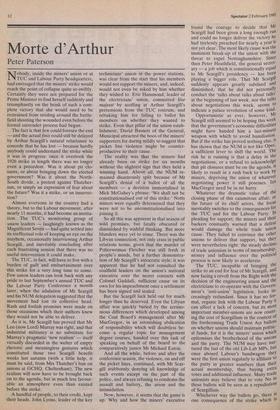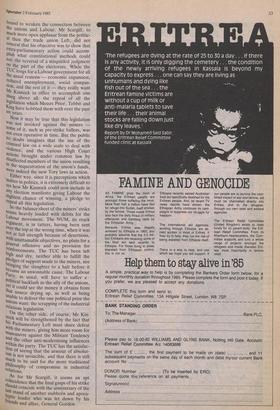Morte d'Arthur
Peter Paterson
Nobody, inside the miners' union or at TUC and Labour Party headquarters, had envisaged that the miners' strike would reach the point of collapse quite so swiftly. Certainly they were not prepared for the Prime Minister to find herself suddenly and triumphantly on the brink of such a com- plete victory that she would need to be restrained from striding around the battle- field shooting the wounded even before the formal surrender process had begun.
The fact is that few could foresee the end — and the actual finis could still be delayed by Arthur Scargill's natural reluctance to concede that he has lost — because hardly anybody could understand the strike while it was in progress: once it overtook the 1926 strike in length there was no longer even a precedent. Was it about pit clo- sures, or about bringing down the elected government? Was it about the North- South divide, a protest against Thatcher- ism, or simply an expression of fear about the future? Was it a strike, or an insurrec- tion?
Almost everyone in the country had a theory, but to the Labour movement, after nearly 11 months, it had become an institu- tion. The TUC's monitoring group of union leaders — laughingly known as the Magnificent Seven — had quite settled into its ineffectual role of keeping an eye on the mayhem, occasionally interviewing Arthur Scargill, and inevitably concluding after each frustrating session that there was no useful intervention it could make.
The TUC, in fact, will have to live with a burden of guilt and embarrassment over this strike for a very long time to come. Few union leaders can look back with any pride to last September's annual TUC and the Labour Party Conference a month. later, when the adulation of Mr Scargill and his NUM delegation suggested that the movement had lost its collective head. Rash and foolish promises were made on those occasions which their authors knew they would not be able to deliver.
As it is, Mr Scargill has proved that Mr Len (now Lord) Murray was right, ancl that industrial militancy is no substitute for Murray's pragmatic 'new realism' — itself virtually discarded in the welter of empty rhetoric and meaningless gestures which constituted those two Scargill benefit weeks last autumn (with a little help, it must be said, from Mrs Thatcher's ban on unions at GCHQ, Cheltenham). The new realism will now have to be brought back on to the agenda, but in much less favour- able an atmosphere even than existed before the strike.
A handful of people, to their credit, kept their heads. John Lyons, leader of the key
technicians' union in the power stations, was clear from the start that his members would not support the miners, and, indeed, would not even be asked by him whether they wished to. Eric Hammond, leader of the electricians' union, committed lese majeste by scoffing at Arthur Scargill's pretensions from the TUC rostrum, and rebuking him for failing to ballot his members on whether they wanted to strike. Even that pillar of the union estab- lishment, David Basnett of the General, Municipal attracted the boos of the miners' supporters for daring mildly to suggest that picket line violence might be counter- productive to their cause.
The reality was that the miners had already been on strike for six months without the slightest sign that they held a winning hand. Above all, the NUM re- mained disastrously split because of Mr Scargill's denial of a ballot of all the members — a decision immortalised in Mick McGahey's phrase: 'We shall not be constitutionalised out of this strike.' Notts miners were equally determined that they were not to be unconstitutionalised into joining it.
So all this was apparent in that season of wild promises, but fatally obscured or diminished by wishful thinking. But more blunders were yet to come. There was the Libyan connection, not only crass in public relations terms, given that the murder of Policewoman Fletcher was still fresh in people's minds, but a further demonstra- tion of Mr Scargill's autocratic style: it was apparent that he had not consulted the coalfield leaders on the union's national executive over the secret contacts with Colonel Gaddafi, sufficient cause on its own for his impeachment once a settlement has been signed and sealed.
But the Scargill luck held out for much. longer than he deserved. Even the Libyan affair was quickly buried by the acrimo- nious differences which developed among the Coal Board's management after Mr MacGregor, in an astonishing abdication of responsibility which will doubtless be- come a regular topic for management degree courses, handed over this task of speaking on behalf of the board to the comparatively junior Mr Michael Eaton.
And all the while, before and after the conference season, the violence, on and off the picket lines, continued, with Mr Scar- gill stubbornly denying all knowledge of such events except on the part of the police, and always refusing to condemn the assault and battery, the arson and the intimidation.
Now; however, it seems that the game is up. Why and how the miners' executive
found the courage to decide that Mt Scargill had been given a long enough run and could no longer deliver the victory he had tirelessly preached for nearly a year is not yet clear. The most likely cause was the imminent break-up of the union with the threat to expel Nottinghamshire. Since then Peter Heathfield, the general secret- ary — a job which is constitutionally equal to Mr Scargill's presidency — has been playing a bigger role. That Mr Scargill suddenly appears greatly subdued and diminished, that he did not personally conduct the 'talks about talks about talks at the beginning of last week, nor the talks about negotiations this week, seems to indicate a palace revolution of some kind. Opportunistic as ever, however, Mr Scargill still seemed to be hoping this week that the government's economic difficulties might have handed him a last-minute weapon with which to avoid humiliation.. But if the strike has proved nothing else, it has shown that the NUM is not like °pee, a sufficient lever to shift the world. The risk he is running is that a delay in the negotiations, or a refusal to acknowledge that pit closures must be on the agenda, is likely to result in a rush back to work hY miners, depriving the union of whatever negotiating power it still posesses. Ian MacGregor need be in no hurry. Whatever the dramatic value of the closing phase of this calamitous affair, or the future of its chief actors, the foals inevitably switches to the consequences for the TUC and for the Labour Party. IP pleading for support, the miners and their backers constantly warned that a defeat would damage the whole trade union cause. They failed to convince the other unions to deliver that support, but theY were nevertheless right: the steady declifle. of trade unionism in terms of membershiP, money and influence over the political process is now likely to accelerate. The TUC, incapable of bringing the, strike to an end for fear of Mr Scargill, and now facing a revolt from the Right with the decision of the engineering union and the electricians to co-operate with the Govern- ment's 'anti-union' legislation, looks in- creasingly redundant. Since it has no for- mal, organic link with the Labour Party It can affect a lack of concern, but its most important member-unions are now count' ing the cost of Scargillism in the context of the forthcoming Trade Union Act ballots on whether unions should maintain politic- al funds, for it is the miners' union which epitomises the brotherhood of the unions and the party. The NUM may have nur- tured the last of the old Lib-Lab MPs, ,bilt once aboard Labour's bandwagon they were the first union regularly to affiliate to the party in greater numbers than their actual membership, thus buying extra votes and additional influence. Many trade unionists may believe that to vote No in these ballots will be seen as a repudiation of Scargillism.
Whichever way the ballots go, there is one consequence of the strike which is bound to weaken the connection between the unions and Labour. Mr Scargill, to much more open applause from the politic- al than the trade union Left, did not conceal that his objective was to show that
extra-parliamentary action could accom-
plish what constitutional methods could not: the reversal of a misguided judgment on the part of the electorate. While the TUC longs for a Labour government for all the usual reasons — economic expansion, reduced unemployment, social compas- sion, and the rest of it — they really want Mr Kinnock in office to accomplish one thing above all: the repeal of all the legislation which Messrs Prior, Tebbit and King have hobbled them with over the past six years.
Now it may be true that this legislation Was not invoked against the miners — some of it, such as pre-strike ballots, was not even operative in time. But the public no doubt imagines that the use of the cri. minal law on a wide scale to deal with violence, and the various High Court actions brought under common law by disaffected members of the union resulting In the sequestration of the union's funds, were indeed the new Tory laws in action. Either way, since it is perceptions which matter in politics, it is extremely difficult to see how Mr Kinnock could now include in any election manifesto giving Labour the slIghtest chance of winning, a pledge to repeal all this legislation. So the balance sheet of the miners' strike seems heavily loaded with debits for the Labour movement. The NUM, its crack regiment, is in tatters, having been sent over the top at the wrong time, when it was not at full strength because of desertions, With unattainable objectives, no plans for a general offensive and no provision for r!inforcements. The TUC has been left high and dry, neither able to fulfill the Pledges of support made to the miners, nor hbrInging the slaughter to a halt before it D'ecalne an unwinnable cause. The Labour arty, as usual, will have to suffer a Political backlash as the ally of the unions, Yet it could see the money it obtains from Mar source drying up, as well as being unable to deliver the one political prize the unions want: the scrapping of the industrial relations legislation.
On the other side, of course, Mr Kin- IlOck will be strengthened by the fact that MS Parliamentary Left must share defeat With the miners, giving him more room for manoeuvre against the Militant Tendency and the other anti-modernising influences Within the party. The TUC has the satisfac- !Ion of seeing that the armour of absolut-
ism, is not invincible, and that there is still much to be said for the more traditional Philosophy of compromise in industrial
• relations.
As for Mr Scargill, it seems an apt coincidence that the final gasps of his strike Should coincide with the anniversary of the !ast stand of another stubborn and apoca- 1ptic leader who was let down by his
ends and allies, General Gordon.











































 Previous page
Previous page